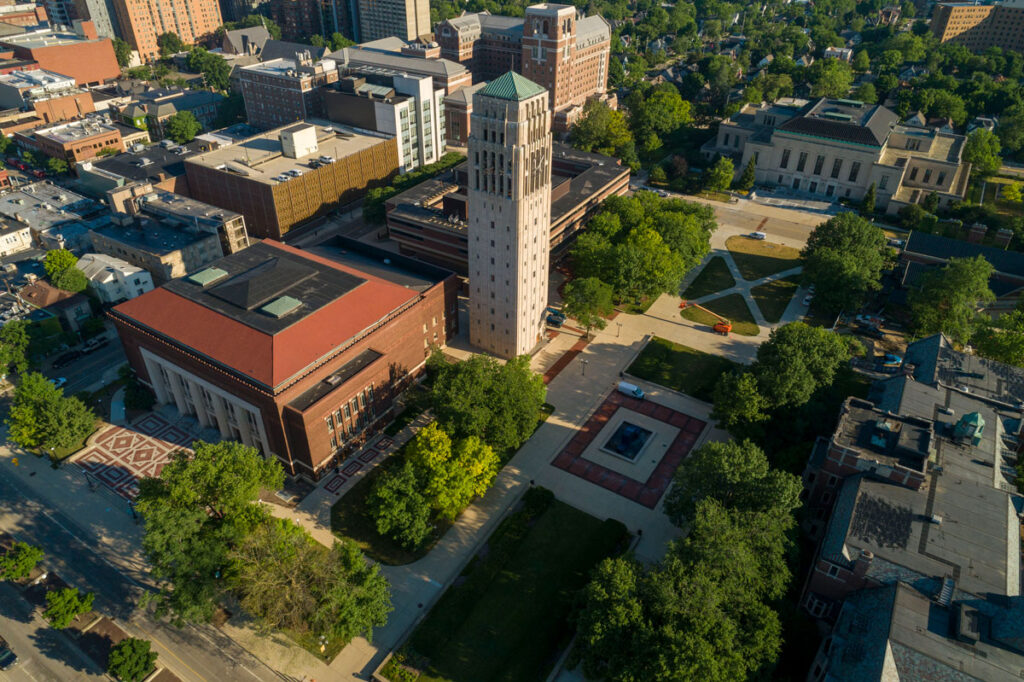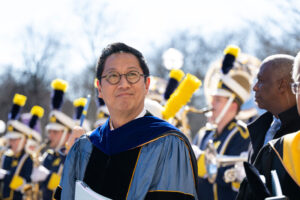
Sean Corp, Communications Lead
This year marks an inflection point for the University of Michigan. In April, with input from more than 25,000 community members, students, faculty, and staff, the university released its strategic roadmap for the next decade—Vision 2034.
The ambitious agenda calls for U-M to be the nation’s defining public university, prioritizing impact in four key areas: life-changing education; human health and well-being; democracy, civic, and global engagement; and climate action, sustainability, and environmental justice.
Harnessing academic innovation to deliver life-changing education has long been a focus of the Center for Academic Innovation (CAI). The university’s Academic Innovation Fund (AIF), created and stewarded by the center, has been integral to engaging faculty innovators in redefining teaching and learning at Michigan since its inception in 2014. Through AIF support, the center has funded nearly 400 faculty projects that have fueled academic innovation in residential and online education, and educational research.
“Over the past decade, the Academic Innovation Fund has played a pivotal role in driving educational innovation at the University of Michigan,” said President Ono. “As we set our sights on the objectives laid out in Vision 2034, the impact of the AIF becomes even more significant. CAI has nurtured a culture of creativity and forward-thinking on our campus, and its work aligns seamlessly with our future aspirations. I am genuinely excited about the path ahead and confident that CAI will continue to steward the AIF as a cornerstone in our journey to provide transformative education for the next generation.”

That includes curricular innovation like supporting the creation of more than 280 massive open online courses that have extended a Michigan education to more than 11 million learners globally. The AIF also led to the creation of Michigan Online, which allows CAI to partner with faculty, schools, and colleges to provide lifelong learning opportunities for students, alumni, staff, and faculty from Ann Arbor, Dearborn, and Flint, and also to serve learners around the world. The fund has also been critical to the establishment of the Teach-Out™ model for open online engagement events focusing on critical issues. Funding has also supported faculty incorporating experiential technologies, like extended reality, into online and residential courses, and provided for the development of technologies that support student success. In total, the center’s suite of educational technology tools is currently used by 99% of undergraduate students on the Ann Arbor campus and more than 250 external organizations. In addition, information from these tools has contributed to more than 130 educational research publications.
“The AIF is a core element of CAI’s model for sustainable innovation and co-creation,” said Laurie McCauley, provost and executive vice president for academic affairs. “Through this initiative, CAI has brought together a vibrant community of faculty, staff, and student innovators who collaborate across disciplines to serve our mission and extend our impact. I celebrate all that we have accomplished together and eagerly anticipate the groundbreaking advancements the next decade will bring.”
Over the next decade, the university will invest in an environment for learners that promotes comprehensive growth, empowers learners to reach their full potential, invests in innovative teaching methods, and works to address the issue of affordability.

“Through the Academic Innovation Fund, we’ve enabled a new model for sustainable innovation that positions us for the future,” said James DeVaney, associate vice provost for academic innovation and founding executive director of the Center for Academic Innovation. “Over the past decade, CAI has empowered faculty, staff, and student innovators to cultivate a culture of creativity and collaboration. As we broaden our collaborations and scale our efforts, this foundation will drive the transformative changes needed to meet the evolving demands of learners and institutions alike.”
10 Years of the Academic Innovation Fund By the Numbers
Vision 2034 life-changing education points of impact and the Academic Innovation Fund.
Investing in Innovation
The AIF continues to invest in innovative teaching methods, educational models and modalities at U-M that meet the needs of today’s learners.
- $21.4M invested in more than 400 projects with 400+ faculty partners from all 19 schools and colleges at the university
- Breakthrough use of extended reality and experiential technologies with 18 schools and colleges, including the first integrations of extended reality 360 video in open online courses on the Coursera platform
- Supported the publication of more than 150 research papers to better understand how people learn and more effective teaching methods
- Launched Online Teaching website to help U-M faculty improve their ability to design, deliver and manage online courses and understand technology and policy considerations.
Connecting and Empowering Learners
AIF-funded projects connect and empower learners everywhere by expanding access, offerings, and delivery to a more diverse community of individuals.
- Created a portfolio of over 280 active open online courses on Michigan Online which have generated more than 20 million enrollments from over 11.5 million learners in more than 195 countries and territories around the world
- Providing U-M students, faculty, staff, and alumni free access to online courses through Michigan Online
- Supported four online degrees, including the university’s largest by enrollment
Supporting Student Success
AIF-supported educational technologies support student success, ensuring that all students have an equal opportunity to access and fully immerse themselves in the transformative U-M experience, regardless of their background.
- Active portfolio of 11 educational technology tools designed to help students make informed decisions, build skills inside and outside the classroom, and support student success
- Educational technologies used by 99% of all undergraduate U-M Ann Arbor students and more than 66% of graduate students
- Spire, used by all business and engineering undergraduates, and extending to public health and engineering master’s students, is designed to help students build targeted competencies, and record, and reflect on their curricular and co-curricular growth at U-M


